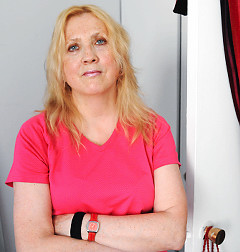Breaking the Silence to Aid Victims of Family Violence

A survivor of domestic violence and rape, Katarina Tepesh has spent much of her adulthood trying to forget.
But after Sept. 11, the 58-year-old Croatian, who immigrated to New York at 17, started trying to remember.
An upper East Sider who works as an accounting supervisor for the YWCA, Tepesh published a memoir last year that will be used to counsel victims of domestic violence. “My father hit me so badly my leg was fractured, and was in severe pain for a month,” recalled Tepesh, who has striking blue eyes. “As an additional punishment, my father forbade my mother to take me to the doctor.”
But her book, “Escape from Despair: A Croatian Family’s Survival,” is not only a story of ghastly abuse. It is the story of a family – its customs, its members’ personalities and the ways the larger society affected this family.
It takes place in Croatia, where Tepesh grew up and which fell under Communist rule during her childhood.
One of the book’s themes is the damage that occurs when people are bullied into silence.
She draws parallels between her father’s repression of the family and the repression of Croatian society behind the Iron Curtain’s Communist regime.
“Our father imposed a silence,” she says, adding wryly, “He certainly didn’t practice democracy.”
Notified by neighbors of abuse in the home, the local police came and did nothing. “An officer walked into the house, saw the signs of abuse, and walked out with [my father],” she writes in the book. “Rather than arresting him, he took him to the closest bar, where they both got drunk.”
Her father’s alcoholism is a subject she tackles head-on, something that he, tragically, was never able to do. “It takes a great deal of courage to stand up and say, ‘I am an alcoholic,'” she says. “Unfortunately, my father grew up in a macho society … with no freedom of expression personally and politically.”
In a chilling chapter detailing her father’s funeral, which she traveled back to Croatia to attend, she also indicts the local clergy of their town, who had failed to intervene.
After describing the priest’s words over her father’s grave, she reflects in the book: “How many times had this same priest seen my mother black-and-blue, with a swollen face, missing teeth, and fractured bones, but had chosen to turn away and say nothing?”
Alongside the story of the abuse is a parallel narrative about her Aunt Anica, who immigrated to the U.S. as a single woman of 35 and eventually married a well-to-do man.
With Anica’s help, Tepesh and her family escaped their father and managed to come to the U.S.
Shortly afterward, she was raped on a date – a trauma she describes in her book.
“It’s something you never get over totally,” she says.
For most of her adulthood, she worked in accounting. At one time, she considered working at a shelter in Brooklyn because she wanted to help abused women and children. But she found it too painful.
“I saw women and children, they were black-and-blue, just like us when we were kids,” she says. “It was too much suffering. I couldn’t deal with it.”
She remains, however, a committed women’s rights advocate, volunteering “behind the scenes” on political campaigns and for the National Organization for Women.
“She has always been loyal, passionate and truly committed to women’s issues,” says her friend Carmen Delgado of the upper West Side, a fellow women’s rights advocate.
But following Sept. 11, Tepesh felt emotionally raw and unable to repress the memories.
She had been a writer for some time. As a contributor to two publications, Zajednicar, a Croatian-American newspaper based in Pittsburgh, and American Home, a Slovenian-American newspaper published in Cleveland, she had covered lighter fare about New York City events like the marathon.
But she poured out her reactions to Sept. 11.
“Being attacked is a horrible feeling, and Sept. 11 reminded me,” she says.
“I wrote about how afraid and unsure we were.”
That experience led her to explore memories of the abuse.
In a class at the Gotham Writers’ Workshop, her instructor, Kathleen Finerman, encouraged her to expand her memories in a book. Self-published in 2007, the book took several years to complete because she wrote it while working full-time.
She learned recently the book, available at www.escapefromdespair.com, will be used as a resource by Mount Sinai Medical Center’s Sexual Assault and Violence Intervention Program, which provides aid and counseling to victims of sexual abuse and domestic violence.
Tepesh, who is single, says she is proud to be helping women through her writing and also through her day job, keeping track of finances for the YWCA’s pension fund.
“My goal today, our goal, is for women to be financially independent,” she says.
This entry was written by Heather Robinson and posted on August 26, 2008 at 2:49 pm and filed under Profiles. permalink. Follow any comments here with the RSS feed for this post. Keywords: human-rights, womens-interest. Post a comment or leave a trackback: Trackback URL. */?>




